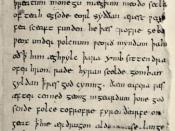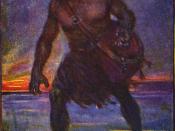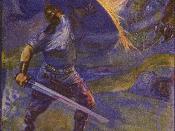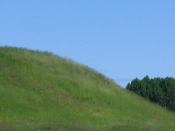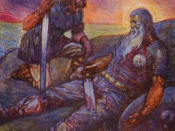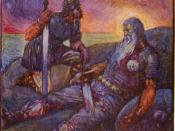Beowulf: The Quintessential Anglo-Saxon HeroIn the ancient times when Germanic tribes thrived in Britain, life was a harsh struggle for survival. The people of this era lived under laws influenced by honor and revenge. Warfare and blood feuds were a deep-rooted part of their culture and everyday lives. In this age of fighting for survival, outstanding warriors were of great value. Certain characteristics came to define such a fighter, and were thus highly prized. These ideals were passed on to the descendants of the Germanic peoples, the Anglo-Saxons. Such qualities can to define the Anglo-saxon idea of a hero. These traits are combined into the main character of the tale Beowulf. Beowulf epitomizes the Anglo-Saxon idea of a hero, showing honor, bravery, and Godly grace.
Beowulf defines his heroic qualitites by dutifully upholding his honor. Though proud and seemingly arrogant, he always backs up his claims. This is illustrated during his battle with grendel.
As Beowulf sees the monster attempt to flee, the hero recalls ÃÂhis final / Boast and, standing erect, stopped / The monsterÃÂs flightÃÂ ÃÂ (ll. 758-60, 123). Beowulf recognizes that he has made statements of his great skill and must live up to them to maintain his honor. Throughout the entire to tale, Beowulf continues to honor his word. Even as he is dying, he tells Wiglaf that he can die happy because he ruled ÃÂÃÂ as well / As [he] knew how, swearing no unholy oaths, / Seeking no lying warsÃÂ ÃÂ (ll. 2742-41, 137). This strongly portrays the importance of honor to Beowulf, as it shows how he judges the quality of his life. This value of honor is a necessary characteristic of the Anglo-Saxon hero.
Another vital heroic characteristic of Beowulf is his courage. He repeatedly acts bravely in situations drastically against his favor. One such situation is his fight with GrendelÃÂs mother. As his weapons and armor fail him, Beowulf does not cosider surrender. Even when the monster has him pinned, blade to his throat, he does not lose his nerve (ll. 1523-56, 129-130). Old age does not erode his brave spirit either. When presented with the challenge of facing the dragon fifty years later, Beowulf proudly tell his companions, ÃÂIÃÂve never known fear; as a youth I fought / In endless battles. I am old, now / But I will fight againÃÂ ÃÂ (ll. 2511-13, 133). True to his honor, Beowulf fights without a flicker of fear. As if expecting his approaching doom, Beowulf continues by saying, ÃÂÃÂ when [the dragon] comes to me / I mean to stand, not run from his shooting/ Flames, stand till fate decides / which of us winsÃÂ (ll. 2524-27, 133). In these statements, and in his final battle, Beowulf truly embodies the concept of courage. He does not know fear, only his duty as both a king and a warrior. For a hero of his caliber, such bravery is important.
Completing BeowulfÃÂs personification of the Anglo-saxon hero is his Godly grace. He falls under the favor of fate and God, while remaining repectful both to his spiritual king and all others who aid him. Fte and God aid Beowulf in his encounter with GrendelÃÂs mother. When the outcome looks grim for the hero, the tale says that ÃÂHoly / God, who sent him victory, gave judgement / For truth and rightÃÂ ÃÂ (ll. 1553-55, 130). This by the grace of God, Beowulf destroys the evil, murderous beast. Beowulf does not take these powerful allies for granted. He recognizes his debt to God and shows his gratitude in his last words. He tells Wiglaf, ÃÂfor this, this gold, these jewels, I thank / Our father in heaven, Ruler of the Earth ÃÂ / For all of this, that His grace has given me, / Allowed me to bring to my people while breath / Still came to my lipsÃÂ (ll. 2794-98, 138). By thanking Gad, Beowulf shows his true reverence to Him, dsiplaying a pious, modest quality. Combined with his favor under God and fate, Beowulfs humility fill out his hero character.
With his amalgamation of the noble traits of honor, valor, and holy grace, Beowulf exemplifies the Anglo-Saxon hero. BeowulfÃÂs honor was of great importance in a time when honor created laws and kept order in the world. The value od his courage stems from the need to right to survive. A fearless fighter such as Beowulf could thrive in such times, and allow those aroudn him to prosper as well. The need for the favor of fate and God for such a hero reflects the intense veneration of the early English people to religion and forces out fo their control. Beowulf is a character made from the needs and ideal of an ancient people who lived a life of struggle.
